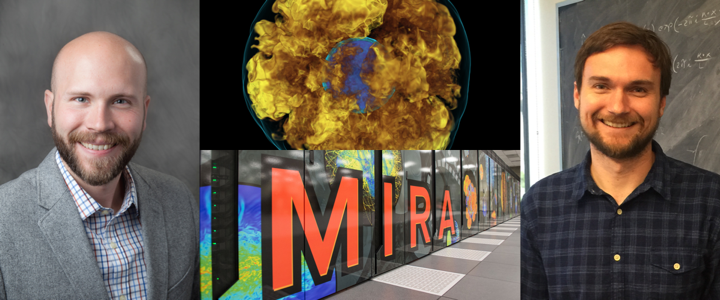Data
Sean Couch and Luke Roberts Receive U.S. Department of Energy SciDAC4 Award

A grant from the U.S. Department of Energy will fund the Towards Exascale Astrophysics of Mergers and Supernovae (TEAMS) research project, headed by William Raphael Hix from Oak Ridge National Laboratory. Improved simulations of supernovae and neutron star mergers carried out by TEAMS researchers will advance our understanding of the creation of the heaviest elements, like gold, silver, and many others, a second key research area of FRIB. How the heavy elements formed following the Big Bang is a longstanding mystery in astrophysics and cosmology.
The five-year award is part of the Scientific Discovery through Advanced Computing (SciDAC4) program supported by the DOE-SC Offices of Nuclear Physics and Advanced Scientific Computing Research. Each SciDAC project is a collaboration between scientists and computational experts at multiple national laboratories and universities, who combine their talents in science and computing to address a selected set of high-priority problems at the leading edge of research in nuclear physics, using the very powerful Leadership Class High Performance Computing (HPC) facilities available now and anticipated in the near future.
“Simulations of heavy-element production has long been a grand challenge problem in astrophysics, always pushing the extremes of what was computationally feasible,” said MSU principal investigator Sean Couch, of the Departments of Physics and Astronomy and Computational Mathematics, Science and Engineering (CMSE), who also has a joint appointment in FRIB. “Now, with next-generation supercomputers combined with the experimental research that will be enabled by FRIB, we are likely to see a revolution in our understanding of these processes.”
Other MSU researchers involved in the TEAMS project are Luke Roberts from the FRIB Laboratory and astronomy group, and Andrew Christlieb, of CMSE.
The Department of Energy has awarded two other SciDAC4 projects at MSU. The second grant is to the NUCLEI (NUclear Computational Low-Energy Initiative) project. MSU researchers associated with the NUCLEI project are Witek Nazarewicz, Scott Bogner and Heiko Hergert of the FRIB Laboratory; and H. Metin Aktulga, of the Department of Computer Science and Engineering.
The third grant was awarded to the Computing the Properties of Matter with Leadership Computing Resources project. Alexei Bazavov, of CMSE and the Department of Physics and Astronomy, is an investigator on the project from MSU. The principal investigator is Robert Edwards from the Thomas Jefferson National Accelerator Facility.
Originally published by MSU's College of Natural Science.
